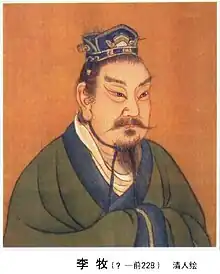Li Mu 李牧 | |
|---|---|
 A Qing dynasty portrait of Li Mu | |
| Died | 229 BC |
| Occupation | Military general |
| Li Mu | |||||||||
|---|---|---|---|---|---|---|---|---|---|
| Traditional Chinese | 李牧 | ||||||||
| Simplified Chinese | 李牧 | ||||||||
| |||||||||
Li Mu (Chinese: 李牧; died 229 BC), personal name Zuo (繓), courtesy name Mu (牧), was a Chinese military General of the State of Zhao during the Warring States period. He is regarded by Chinese folklore as one of the four Greatest Generals of the Late Warring States period, along with Bai Qi, Wang Jian, and Lian Po. He's widely considered as one of the best defensive tacticians commanders of ancient warfare.
Life
In 265 BC, Li Mu was stationed in Yanmen Commandery and ordered to defend northwestern commanderies of Yanshan (雁山) and Daijun (代郡) from raids instigated by the Xiongnu (匈奴) and other tribes. He initially adopted an extremely defensive strategy, for which he was accused of cowardice and thereafter replaced by a more aggressive general.
The Zhao state prepared an army of 1,300 war chariots, 13,000 cavalry, 50,000 infantry and 100,000 archers. The army was scattered in the countryside. The Xiongnu sent a small force to raid the border, and Li Mu pretended to be defeated, and abandoned a few thousand men to the Xiongnu. The chanyu (or shan-yü, title for the chief of the Xiongnu) heard of this and then sent a large force to invade Zhao. The Zhao divided into two armies, encircled and beat the Xiongnu, killing hundreds of thousands of men and horses. Then the Zhao exterminated the Dan Lan, defeated the Dong Hu, forced the Lin Hu to surrender, making the shan-yü flee.[1]
In 243 BC, Li Mu took over command in the war against Yan and managed to conquer Wusui (武遂) and Fangcheng (方城).[2]
Later, as the threat from Qin increased with the previous ascension of King Zheng, Li Mu turned his focus more towards the western parts of Zhao. However, the State of Zhao was significantly weakened. After having previously suffered utter defeat at the hands of Qin forces led by Bai Qi during, and in the aftermath of, the Battle of Changping in 260 BC, in which Zhao had lost virtually its entire army, most of the core Zhao territories had fallen to Qin. Furthermore, Zhao was diplomatically isolated as the Kingdoms of Wei, Yan, and Han were too weak to offer any kind of support, while Qi and Chu were more willing to see the kingdom extinguished than face the powerful Qin.
Nevertheless, Li Mu could still hold out against and compete with the much stronger Qin forces. So while Qin could raid Wei and Han at will, they had a much harder time pillaging in Zhao.
In 233 BC, when Qin forces under general Huan Yi (桓齮) attacked the cities of Chili (赤麗) and Yi'an (宜安). Li Mu was appointed as commander in chief of the Zhao army, engaging and crushing the Qin army at Yi'an (宜安; around present-day Shijiazhuang, Hebei) or Feixia (肥; west of present-day Jinzhou, Hebei province, China), depending on the different sources. For this accomplishment he was rewarded with the title of Marquis of Wu'an (武安君).
During the year 232 BC, a Qin army invaded Zhao and captured the City of Langmeng, but were once again defeated by Li Mu at the Battle of Fanwu (番吾; in present-day Pingshan, Hebei).[3] Li Mu (according to some interpretations) also held off a Han-Wei incursion in Southern Zhao, after this battle the Zhao forces withdrew into their capital area.
Eliminating Li Mu became a necessity for Qin to conquer Zhao and ultimately to unify China. In 229 BC, in light of Wang Jian's invasion of Zhao, where Li Mu had already achieved an stalemate against the Qin Generals Wang Jian, Yang Duan He and Qiang Lei; the Qin decided to sent spies to the Zhao court, bribing key courtiers such as Guo Kai (郭開) and Han Cang (韓倉) in order to convince them to persuade the King of Zhao to replace Li Mu and Sima Shang (司馬尚) with Zhao Cong (趙蔥) and Yan Ju (顏聚) as generals by alleging that the former were planning a rebellion.
The plan succeeded. Li Mu was expelled from his position and soon thereafter either executed or forced to commit suicide on the king's orders.[4]
With Li Mu's death, the fall of Zhao became inevitable, as the state was swiftly crushed afterwards by Qin forces. And in just a few years' time the state of Dai would also fall, therefore putting an end to the last remnants of Zhao.
Legacy
Li Mu sometimes appears as a menshen on Chinese and Taoist temples, usually paired with Bai Qi. He is also commemorated at Zhenbian Hall, a temple beside the Tianxian Gate at Yanmen Pass in Shanxi.[5]
References
Citations
Bibliography
- "Yanmenguan Great Wall", Travel China Guide, Xi'an.
- Cosmo, Nicola Di (2002). Ancient China and Its Enemies: The Rise of Nomadic Power in East Asian History. Cambridge University Press. ISBN 978-0-521-54382-8.